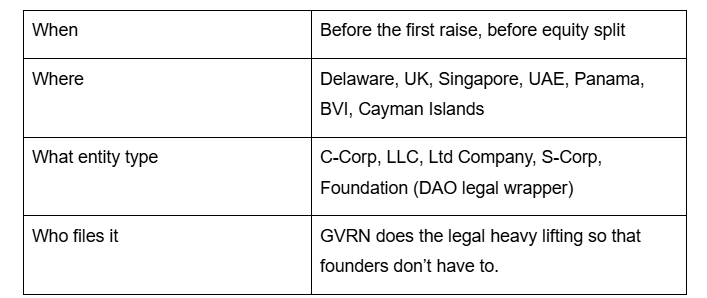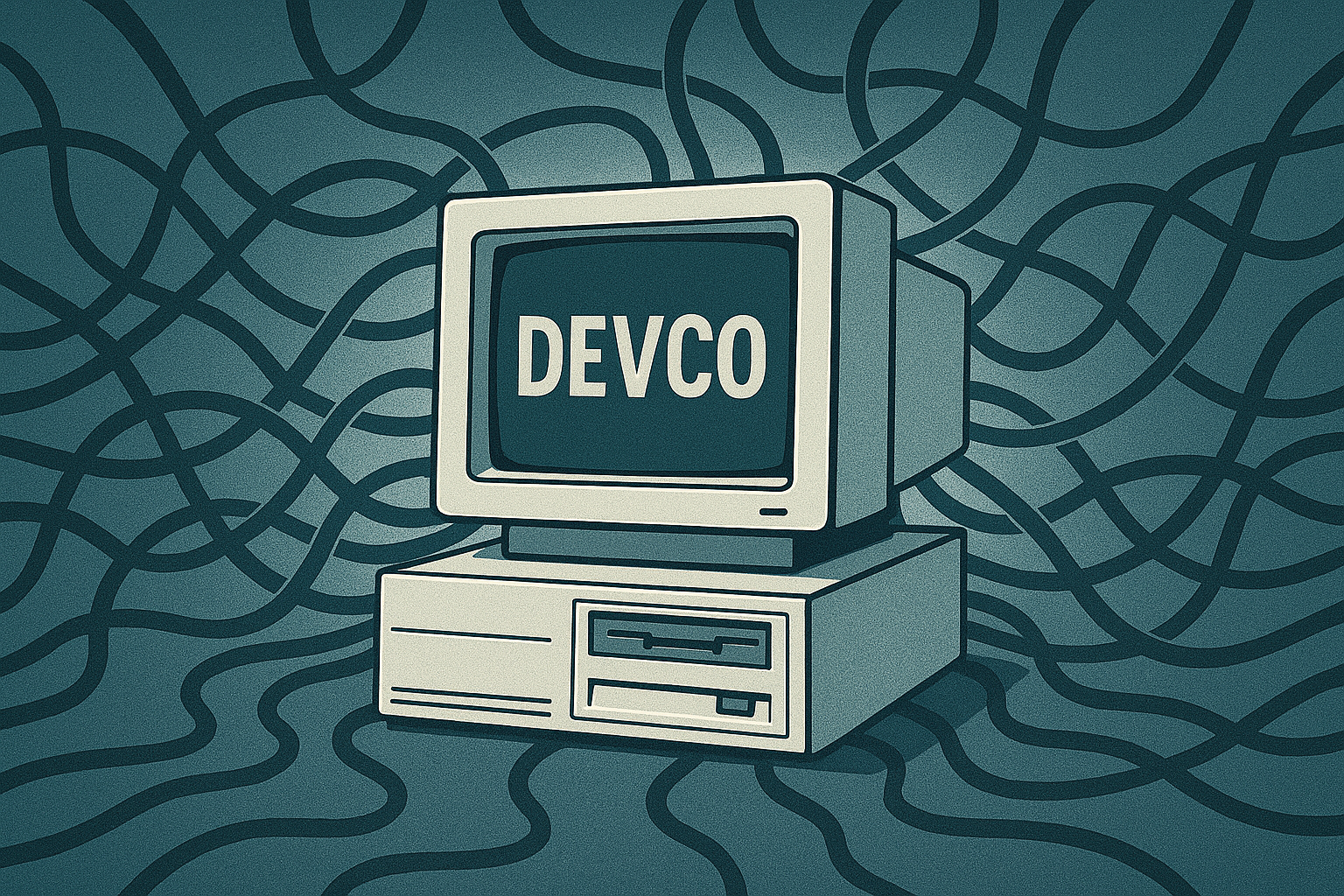How to Incorporate Your Web3 Startup: Founder’s Step-by-Step Guide
Incorporation in 60 Seconds

Fast download: Incorporation checklist (PDF or Notion)
Why Incorporate a Startup?
Incorporating a startup separates your business obligations from your personal finances. It formalizes ownership, streamlines investment structure, and shields personal assets from company debt or contractual disputes.
That said, incorporation isn’t a free pass. Founders and investors remain personally liable if they engage in fraud or misrepresentation.
When Should You Incorporate?
The best time to incorporate a Web3 startup is before your first raise, equity split, or team onboarding. These early moves are prime opportunities to structure ownership, issue equity, and prepare for fundraising.
Some founders choose to formalize their business after MVP validation, after proving product-market fit, delivering value, and securing user traction. While strategic, this approach carries legal risk of serving an undefined jurisdiction, the founders and the business to liabilities.
Where Should You Incorporate?
If you are a US based team, Delaware would be an optimal choice because its corporate laws are startup-tested and investor-friendly. But incorporation isn’t one-size-fits-all.
Choose a jurisdiction based on what is easiest for your stakeholders. Consider the ease of doing business, banking access, fiat rails and long-term scale.
Delaware C-Corp (U.S. Founders)
Offers strong liability protection, founder flexibility, and investor familiarity. Delaware’s legal precedents and corporate tax benefits are built for scale.
UK Ltd (for UK/EU founders)
Benefit from low corporate taxes, straightforward incorporation, and access to 130+ tax treaties that can reduce international friction.
UAE Freezone
Fast-tracked incorporation with minimal red-tape, especially a great fit for Web3 startups. The two types of companies you can register are the Free Zone Limited Liability Company and the Free Zone Establishment.
Singapore (APAC growth)
Singapore positions you near key markets such as Thailand, Vietnam, Indonesia, and Malaysia with relatively low corporate tax of 17%, and no taxes applied to capital gains
Offshore setups (Panama, BVI, Caymans)
Ideal for token-centric models or DAO structures. These jurisdictions offer zero corporate, capital gains, or estate taxes with lightweight compliance. Choose carefully: offshore setups can raise regulatory scrutiny in some investor circles.

What Type of Entity Should You Choose?
Choosing the right legal structure sets the tone for how you raise, scale, and exit. Each entity type carries trade-offs in taxation, liability, and investor readiness.
C-Corp
Delaware C-Corporation provides the advantage of Delaware’s robust corporate laws, a startup-friendly legal system, and ability to issue unlimited types of equity when raising funding. Preferred by VCs and institutional investors.
LLC
LLCs offer liability protection and avoid double taxation via pass-through treatment. But they’re rarely VC-friendly. Tax pass-throughs, restricted stock options, and murky exit paths make them more suited to small, bootstrapped ventures.
Ltd Company (UK)
U.K. Ltd structures limit shareholder liability to capital invested. Profits aren’t taxed as income, but the company pays corporate tax, and dividends are taxed at lower rates. Clean for international growth—especially across Europe.
S-Corp (US tax-based)
An S-Corp is a tax designation, not an entity. It avoids federal corporate taxes by passing income directly to shareholders. However, strict eligibility rules and limitations on equity types often disqualify it for serious VC rounds.
Foundation or DAO legal wrapper (Web3-specific)
For token-first or protocol-layer projects, foundations or DAO wrappers are essential. They provide a compliant legal shell while preserving on-chain governance. Operating a DAO without formal structure exposes members to liability under unregistered partnership laws, a legal risk with real teeth.
The Step-by-Step Incorporation Process
Step 1: Choose a name
Start by picking a name for your startup. Check for domain availability, trademark clearance, social handle uniqueness, and SEO viability.
Step 2: Select jurisdiction + entity type
Select the right combination of jurisdiction and legal structure based on founder location, fundraising plans, and long-term goals.
Step 3: Prepare documents (AoA, Bylaws, Founders’ Agreement)
Prepare all the required documents, including the Founders’ Agreement, the startup’s Bylaws, and the AoA.
Step 4: File with the relevant authority
Once all documents are investor-ready, file your application with a relevant authority and submit the articles of incorporation. If incorporating outside your home country, you may need a registered agent.
Step 5: Get EIN / Company Number
In the U.S., apply for an Employer Identification Number (EIN) via the IRS. Other jurisdictions will issue a business ID or registration number through their respective agencies.
Step 6: Open a business bank account
Set-up a startup-dedicated bank account to transact legally. Web3 founders, especially, prioritize banks or fintechs that support crypto-related activity and international transfers.
Step 7: Issue founder equity (via cap table software)
Draw a detailed breakdown of your company’s ownership structure, outline what proportion of equity each shareholder owns, and represent the information in a capitalization table.
Step 8: Register for taxes (IRAS, HMRC, VAT if needed)
Register with the relevant tax authority:
- U.S.: IRS for federal and state taxes
- U.K.: HMRC for Corporation Tax and VAT (above £90,000 revenue)
- Singapore, UAE, etc.: Follow local requirements
What Documents Do You Need?
Articles of Incorporation / Certificate of Incorporation
This is your startup’s legal birth certificate. File Articles of Incorporation with the relevant authority to receive an official Certificate, outlining your company’s purpose, governance, and share structure.
Bylaws / Operating Agreement
These are your internal rulebooks.
- Bylaws define how the company operates, board procedures, voting rights, and internal governance.
- Operating Agreements (for LLCs) bind members to a clear decision-making structure.
Shareholder agreements
Set the rules of engagement between founders, investors, and early employees. Define share ownership, transfer rights, dispute resolution, and exit procedures. Best drafted with legal counsel, these shape cap table dynamics and investor trust.
Equity issuance docs
Formally issue shares to founders, employees, and investors. This includes subscription agreements, stock option plans, and board approvals, all traceable in cap table software.
Founder IP assignment
Legally transfer all intellectual property including code, branding, product ideas, from the founder(s) to the company. Non-negotiable for any serious funding round.
Tools and Services to Help You Incorporate
Not all incorporation tools are built equally. Stripe Atlas covers the basics. Clerky works for standard SaaS. But GVRN is purpose-built for Web3, where token rights, DAO wrappers, and cap table logic are non-negotiables.
Let’s break down your options:
Stripe Atlas
It simplifies business formation by equipping you with everything needed to incorporate a business and start accepting payments.
Clerky
An alternative startup formation tool, provides a Pay-per-use model, which makes it relatively affordable for early growth founders.
SeedLegals (UK)
Ideal for founders in the UK to start and grow their businesses by simplifying legal processes and fundraising.
Local lLegal counsel vs DIY
Yes, you can do it yourself. But unless you’re legally fluent, professional counsel is the smart choice. Missed clauses in IP, vesting, or governance cost more to unwind than to prevent.
“Why GVRN supports founders after incorporation, not just during it.”
Formation is step one. But building a legally sound, scalable Web3 company? That takes more. GVRN equips founders with a blueprint for compliance; DAO wrappers, token rights, multi-entity structuring, beyond boilerplate documents.
Mistakes Founders Make When Incorporating
- Wrong jurisdiction: Choosing the wrong jurisdiction is a common, avoidable mistake that may end up causing friction between you, the business, and the authorities.
- Poor equity split: Conflicts to do with equity splits often arise as a result of unequal splits, lack of vesting schedules, and the event that a founder neglects their responsibilities.
- No founder vesting schedule: Founder vesting schedule aligns the incentives of starting the business and stimulates long-term business commitment by preventing premature exits.
- Not setting up IP assignments: An investor-ready startup must have proper IP rights and agreements to prevent future business disputes.
- Using templates without review: Most templates are general, inaccurate and may not serve all jurisdictions and business types. If you must use one, ensure it’s prepared by a premium service and havehas a lawyer walk you through it.
FAQs
- Do I need to incorporate before raising? Yes. Incorporation separates personal assets from business risk.
- Why does every VC want a Delaware C-Corp? Every VC prefers a Delaware C-Corp due to clear corporate laws, an established legal system and the tax advantages of a C Corporation.
- Can I change jurisdictions later if I made a mistake? Yes, but it's costly and complex. It often involves dissolving the existing entity and incorporating it afresh in the new jurisdiction.
- How muchWhat does incorporation cost? Costs vary by jurisdiction and legal support. Expect filing fees, tax registration, and (recommended) legal counsel.
- Can I DIY incorporation? Yes. DIY is an option. But, unless you’re legally fluent, the risk of future errors outweighs short-term savings.
Incorporating your Web3 startup feels like a hassle at first but its benefits are long-term and far outweigh the cost of not getting it right.
Not sure of where to start? We’ve built a free Founder’s Checklist in Notion to help you structure your Web3 startup from day one.
Download: The GVRN Founder Incorporation Checklist
Available as PDF or Notion
(Embed as a gated asset for email capture.)
Final Thoughts: Incorporate for Scale, Not Just for Form
When you incorporate a Web3 startup, it becomes a separate legal entity distinct from your personal assets. Aside from protecting you from potential future liabilities like debt and insolvency, an incorporated startup attracts investors, maximizes tax benefits, gives the founder functional ownership and control structures to run the company.
Already incorporated? Let’s help you go further. Contact our team to navigate post-incorporation using our bespoke fundraising software and term sheet generator.
.png)
.png)






